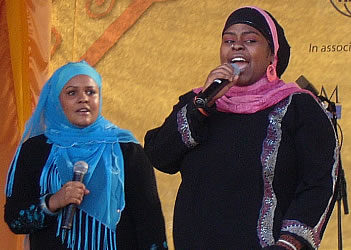
Fast forward to April 3rd, the first day of the Trinity festival. I woke up before the sun (which, for a college student, is a feat all in itself), got in my car and set off on the five hour drive to Hartford. Due to traffic, I showed up at 10:20, 20 minutes late to the first event of the day, a discussion on hip-hop, Islam and gender with the duo Poetic Pilgrimage. It was set up in a classroom, and it seemed that I was the only attendee who wasn't in the class. I didn't have time to set up a camera, so I snuck to a desk to listen to what Poetic Pilgrimage had to say. Poetic Pilgrimage is made up of two women from Bristol, England, Muneera Rashida and Sukina Abdul Noor. Both women have Jamaican roots, and both are converts to Islam. They made a name for themselves on the London poetry circuit, and they "have become one of the most well-known and well-respected Muslim hip hop crews in the world," according to Greg Schick.
Here's a video of their song Definition of a Pilgrim:
Muneera and Sukina only spoke for about 50 minutes, and I missed the first 20, but I did learn what hip-hop means to them in the short bits I did see. They spent most of the time talking about how once they converted to Islam and became involved in the hip-hop community, they felt immediately a part of a global culture. "All of a sudden, Islam's problems were my problems," Muneera said, and their music and spoken word poetry was influenced by this feeling of inclusion. Sukina also talked about wearing a hijab, the head covering traditionally worn by Muslim women, and how it opened her eyes to the gender stereotypes and inequalities that many Muslim women face. Poetic Pilgrimage then performed a short spoken-word piece, which talked about the problems Islam faces around the world, including homosexual discrimination. What I gathered from watching the presentation was that both of these women identified themselves with larger global communities. They felt that they were women, Jamaican, English, Muslim and hip-hop artists, and by identifying themselves in these ways, they included themselves in each of these global communities.
No comments:
Post a Comment